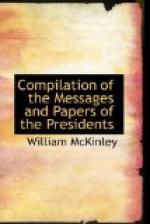The enforcement of this enlarged and onerous code of neutrality would only be influential within our own jurisdiction by land and sea and applicable by our own instrumentalities. It could impart to the United States no jurisdiction between Spain and the insurgents. It would give the United States no right of intervention to enforce the conduct of the strife within the paramount authority of Spain according to the international code of war.
For these reasons I regard the recognition of the belligerency of the Cuban insurgents as now unwise, and therefore inadmissible. Should that step hereafter be deemed wise as a measure of right and duty, the Executive will take it.
Intervention upon humanitarian grounds has been frequently suggested and has not failed to receive my most anxious and earnest consideration. But should such a step be now taken, when it is apparent that a hopeful change has supervened in the policy of Spain toward Cuba? A new government has taken office in the mother country. It is pledged in advance to the declaration that all the effort in the world can not suffice to maintain peace in Cuba by the bayonet; that vague promises of reform after subjugation afford no solution of the insular problem; that with a substitution of commanders must come a change of the past system of warfare for one in harmony with a new policy, which shall no longer aim to drive the Cubans to the “horrible alternative of taking to the thicket or succumbing in misery;” that reforms must be instituted in accordance with the needs and circumstances of the time, and that these reforms, while designed to give full autonomy to the colony and to create a virtual entity and self-controlled administration, shall yet conserve and affirm the sovereignty of Spain by a just distribution of powers and burdens upon a basis of mutual interest untainted by methods of selfish expediency.
The first acts of the new government lie in these honorable paths. The policy of cruel rapine and extermination that so long shocked the universal sentiment of humanity has been reversed. Under the new military commander a broad clemency is proffered. Measures have already been set on foot to relieve the horrors of starvation. The power of the Spanish armies, it is asserted, is to be used not to spread ruin and desolation, but to protect the resumption of peaceful agricultural pursuits and productive industries. That past methods are futile to force a peace by subjugation is freely admitted, and that ruin without conciliation must inevitably fail to win for Spain the fidelity of a contented dependency.




